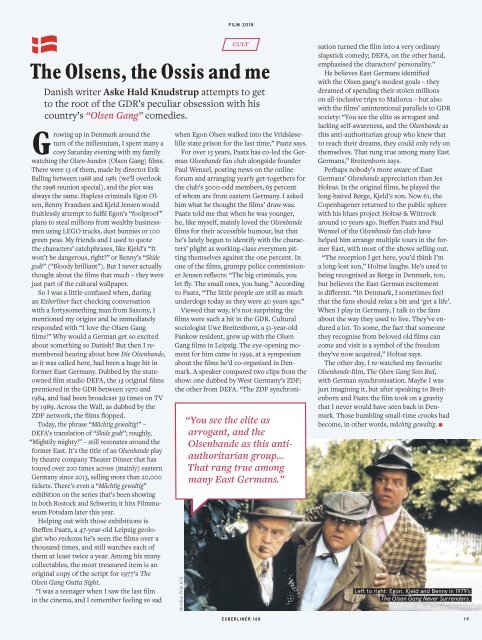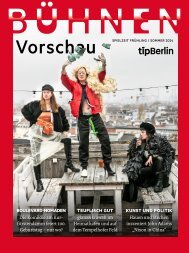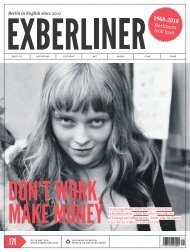EXBERLINER Issue 168, February 2018
Create successful ePaper yourself
Turn your PDF publications into a flip-book with our unique Google optimized e-Paper software.
FILM <strong>2018</strong><br />
The Olsens, the Ossis and me<br />
Danish writer Aske Hald Knudstrup attempts to get<br />
to the root of the GDR’s peculiar obsession with his<br />
country’s “Olsen Gang” comedies.<br />
Growing up in Denmark around the<br />
turn of the millennium, I spent many a<br />
cosy Saturday evening with my family<br />
watching the Olsen-banden (Olsen Gang) films.<br />
There were 13 of them, made by director Erik<br />
Balling between 1968 and 1981 (we’ll overlook<br />
the 1998 reunion special), and the plot was<br />
always the same. Hapless criminals Egon Olsen,<br />
Benny Frandsen and Kjeld Jensen would<br />
fruitlessly attempt to fulfil Egon’s “foolproof”<br />
plans to steal millions from wealthy businessmen<br />
using LEGO trucks, dust bunnies or 100<br />
green peas. My friends and I used to quote<br />
the characters’ catchphrases, like Kjeld’s “It<br />
won’t be dangerous, right?” or Benny’s “Skide<br />
godt” (“Bloody brilliant”). But I never actually<br />
thought about the films that much – they were<br />
just part of the cultural wallpaper.<br />
So I was a little confused when, during<br />
an Exberliner fact-checking conversation<br />
with a fortysomething man from Saxony, I<br />
mentioned my origins and he immediately<br />
responded with “I love the Olsen Gang<br />
films!” Why would a German get so excited<br />
about something so Danish? But then I remembered<br />
hearing about how Die Olsenbande,<br />
as it was called here, had been a huge hit in<br />
former East Germany. Dubbed by the stateowned<br />
film studio DEFA, the 13 original films<br />
premiered in the GDR between 1970 and<br />
1984, and had been broadcast 39 times on TV<br />
by 1989. Across the Wall, as dubbed by the<br />
ZDF network, the films flopped.<br />
Today, the phrase “Mächtig gewaltig!” –<br />
DEFA’s translation of “Skide godt”; roughly,<br />
“Mightily mighty!” – still resonates around the<br />
former East. It’s the title of an Olsenbande play<br />
by theatre company Theater Dinner that has<br />
toured over 200 times across (mainly) eastern<br />
Germany since 2013, selling more than 20,000<br />
tickets. There’s even a “Mächtig gewaltig”<br />
exhibition on the series that’s been showing<br />
in both Rostock and Schwerin; it hits Filmmuseum<br />
Potsdam later this year.<br />
Helping out with those exhibitions is<br />
Steffen Paatz, a 47-year-old Leipzig geologist<br />
who reckons he’s seen the films over a<br />
thousand times, and still watches each of<br />
them at least twice a year. Among his many<br />
collectables, the most treasured item is an<br />
original copy of the script for 1977’s The<br />
Olsen Gang Outta Sight.<br />
“I was a teenager when I saw the last film<br />
in the cinema, and I remember feeling so sad<br />
Nordisk Film A/S<br />
CULT<br />
“You see the elite as<br />
arrogant, and the<br />
Olsenbande as this antiauthoritarian<br />
group...<br />
That rang true among<br />
many East Germans.”<br />
<strong>EXBERLINER</strong> <strong>168</strong><br />
when Egon Olsen walked into the Vridsløselille<br />
state prison for the last time,” Paatz says.<br />
For over 15 years, Paatz has co-led the German<br />
Olsenbande fan club alongside founder<br />
Paul Wenzel, posting news on the online<br />
forum and arranging yearly get-togethers for<br />
the club’s 3000-odd members, 65 percent<br />
of whom are from eastern Germany. I asked<br />
him what he thought the films’ draw was.<br />
Paatz told me that when he was younger,<br />
he, like myself, mainly loved the Olsenbande<br />
films for their accessible humour, but that<br />
he’s lately begun to identify with the characters’<br />
plight as working-class everymen pitting<br />
themselves against the one percent. In<br />
one of the films, grumpy police commissioner<br />
Jensen reflects: “The big criminals, you<br />
let fly. The small ones, you hang.” According<br />
to Paatz, “The little people are still as much<br />
underdogs today as they were 40 years ago.”<br />
Viewed that way, it’s not surprising the<br />
films were such a hit in the GDR. Cultural<br />
sociologist Uwe Breitenborn, a 51-year-old<br />
Pankow resident, grew up with the Olsen<br />
Gang films in Leipzig. The eye-opening moment<br />
for him came in 1992, at a symposium<br />
about the films he’d co-organised in Denmark.<br />
A speaker compared two clips from the<br />
show: one dubbed by West Germany’s ZDF;<br />
the other from DEFA. “The ZDF synchronisation<br />
turned the film into a very ordinary<br />
slapstick comedy; DEFA, on the other hand,<br />
emphasised the characters’ personality.”<br />
He believes East Germans identified<br />
with the Olsen gang’s modest goals – they<br />
dreamed of spending their stolen millions<br />
on all-inclusive trips to Mallorca – but also<br />
with the films’ unintentional parallels to GDR<br />
society: “You see the elite as arrogant and<br />
lacking self-awareness, and the Olsenbande as<br />
this anti-authoritarian group who knew that<br />
to reach their dreams, they could only rely on<br />
themselves. That rung true among many East<br />
Germans,” Breitenborn says.<br />
Perhaps nobody’s more aware of East<br />
Germans’ Olsenbande appreciation than Jes<br />
Holtsø. In the original films, he played the<br />
long-haired Børge, Kjeld’s son. Now 61, the<br />
Copenhagener returned to the public sphere<br />
with his blues project Holtsø & Wittrock<br />
around 10 years ago. Steffen Paatz and Paul<br />
Wenzel of the Olsenbande fan club have<br />
helped him arrange multiple tours in the former<br />
East, with most of the shows selling out.<br />
“The reception I get here, you’d think I’m<br />
a long-lost son,” Holtsø laughs. He’s used to<br />
being recognised as Børge in Denmark, too,<br />
but believes the East German excitement<br />
is different. “In Denmark, I sometimes feel<br />
that the fans should relax a bit and ‘get a life’.<br />
When I play in Germany, I talk to the fans<br />
about the way they used to live. They’ve endured<br />
a lot. To some, the fact that someone<br />
they recognise from beloved old films can<br />
come and visit is a symbol of the freedom<br />
they’ve now acquired,” Holtsø says.<br />
The other day, I re-watched my favourite<br />
Olsenbande-film, The Olsen Gang Sees Red,<br />
with German synchronisation. Maybe I was<br />
just imagining it, but after speaking to Breitenborn<br />
and Paatz the film took on a gravity<br />
that I never would have seen back in Denmark.<br />
Those bumbling small-time crooks had<br />
become, in other words, mächtig gewaltig. ■<br />
Left to right: Egon, Kjeld and Benny in 1979’s<br />
The Olsen Gang Never Surrenders.<br />
19

















